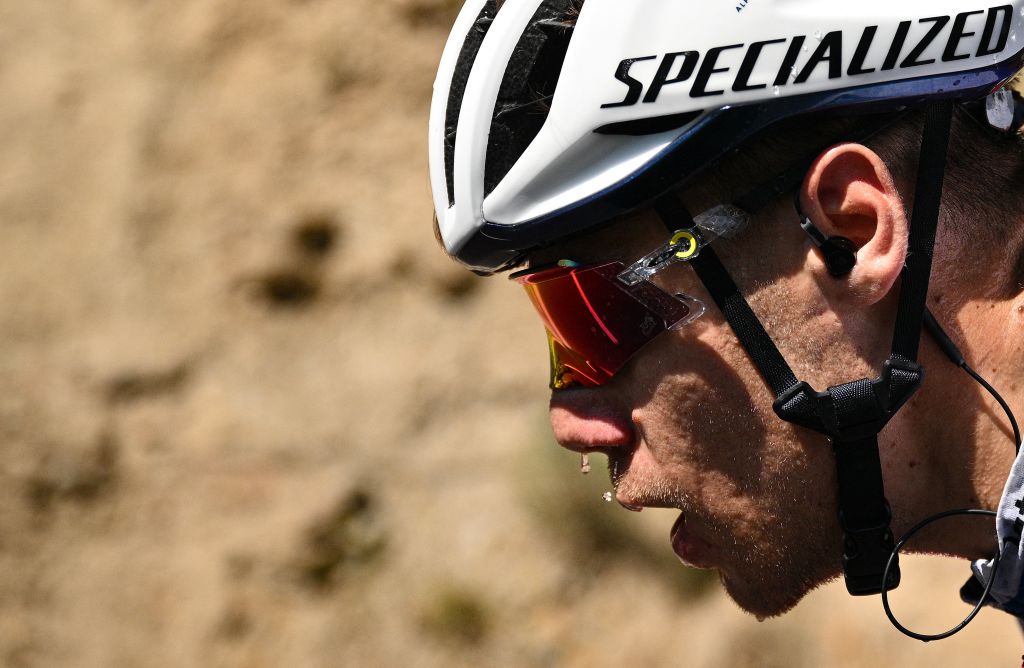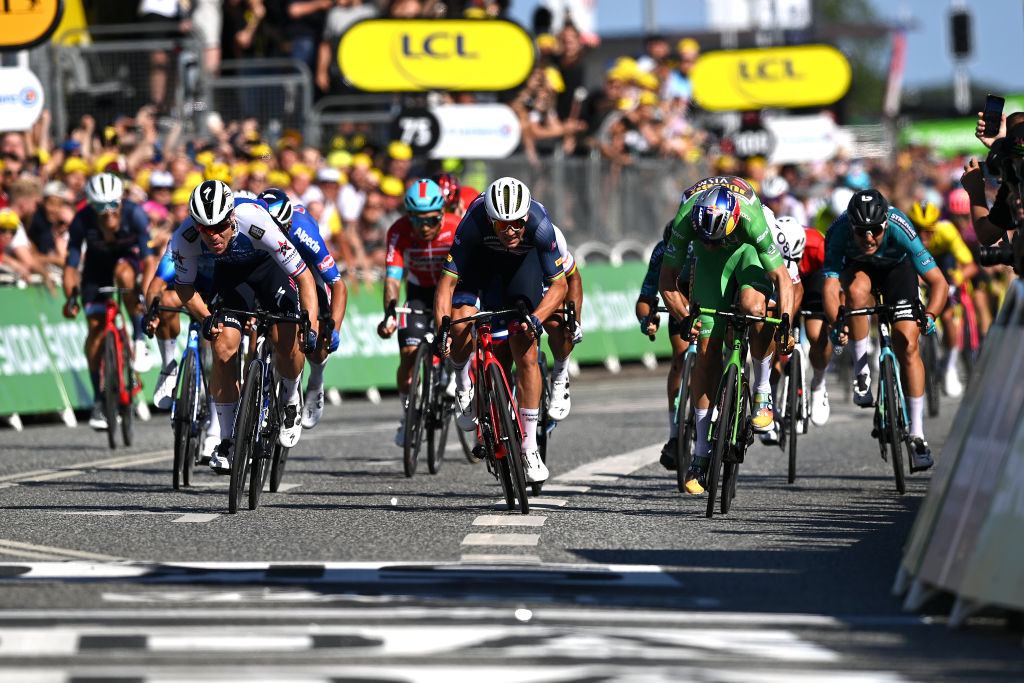No Tour for fast men – Mørkøv guides Jakobsen in search of another sprint
‘50-50 chance’ of sprint in Carcassonne on stage 15 of the Tour de France, says Dane

Michael Mørkøv has built a deserved reputation as the best lead-out man in professional cycling, but his shepherding duties are not confined to the tight spaces of the final kilometre. This July, he has also been guiding his QuickStep-AlphaVinyl sprinter Fabio Jakobsen through the vast, lonesome expanses of the high mountains.
The Alps are a forbidding sort of a place for a sprinter at the best of times. On this Tour de France, the white heat of the current canicule and the red-hot pace imposed by Tadej Pogačar, Jonas Vingegaard et al have combined to make the high mountains feel rather more akin to the lower circles of Hell.
“The racing this year in the Tour has been very extreme,” Mørkøv told Cyclingnews in Saint-Étienne on Saturday. “The first part of the race has been super fast. And the stages in the Alps were tough for us, because in front they were deciding the GC and that made it really fast.”
Mørkøv spent stage 11 pacing and cajoling Jakobsen over the Col du Télégraphe, Col du Galibier and Col du Granon, battling to make the time limit. They reached the summit of the final climb just inside the cut, a little over 40 minutes down on Vingegaard. A day later, they again propped up the field at Alpe d’Huez with a more or less identical deficit on the winner Tom Pidcock (Ineos Grenadiers). This may be no Tour for fast men, but that doesn’t mean they ever get a day off.
“Of course, during the day we are worried about the time limit, because we never know what it is before the first rider has finished, so we can only estimate what it will be,” Mørkøv said of their close encounter with finishing hors délai on the Granon.
“The whole day, we were under pressure to stay within the time limit, but then when we reached the final climb, once Jonas had won the stage, we knew the time cut. After that, we could manage our energy to finish within the time limit.”
Mørkøv’s track pedigree stands him in good stead amid the tumult of Tour finales, where men like Jakobsen, Mark Cavendish and Alexander Kristoff have placed their utmost trust in his judgement to guide them through the swirling mass of bikes and bodies and swear words. In the mountains, his inherent calm and his ability to calculate on the hoof makes him equally valuable as a sherpa.
Get The Leadout Newsletter
The latest race content, interviews, features, reviews and expert buying guides, direct to your inbox!
“I just try to encourage Jakob and motivate him and make him believe in my calculations,” Mørkøv said. “I’m always calculating exactly what we need to do for each kilometre on the climb to stay within the cut, and of course I try to go as slow as possible so I’m not pushing his limits too far.”
The idea is to preserve Jakobsen’s fast-twitch fibres as best as possible for the days suited to his talents. The problem, of course, is that this year’s Tour has provided notably few opportunities for the sprinters. That already seemed likely when the route was presented in Paris last October, but the reality has been even more sobering than those initial, sober projections. There have been just two real bunch sprints on this Tour, both in Mørkøv’s native Denmark on the opening weekend of the race.

Since then, there have been group finishes, but the purest sprinters – riders like Jakobsen, Dylan Groenewegen and Jasper Philipsen – have been burnt off before the finale. Friday’s stage to Saint-Étienne was, on paper, a chance for the sprinters. In practice, the combination of rolling terrain, cumulative fatigue and a break of motivated strongmen put the stage win beyond the reach of Jakobsen et al.
“We kind of hoped for Saint-Étienne, but while we came close, we could also see that it would be a very hard parcours to manage for a sprint, especially after the Alpine stages in the days before,” Mørkøv explained. “So the chances in this Tour are limited.”
Last year’s Tour was a race of plenty for Mørkøv and QuickStep, with the Dane helping Mark Cavendish to four stage victories, while Julian Alaphilippe won the opening stage for a temporary hold on the maillot jaune. This time out, QuickStep took yellow through Yves Lampaert in the opening time trial and then Jakobsen confirmed his ability by winning the first road stage.
Since then, however, the team has struggled to get a look in. Their Tour is already a success due to that fast start in Denmark, but eaten bread is soon forgotten. The Grand Départ already feels far longer than two weeks ago.
“At some point, the pressure to win starts again, but we knew that winning one of the first sprints was very important for us. We don’t have many chances and at least we have that. But at this moment, it feels far away,” said Mørkøv. The team tried to orchestrate a sprint in Saint-Étienne on Friday, but circumstances conspired against it.
“We would probably have made it to a bunch sprint if it was one of the first stages of the Tour, but after the three very hard days in the Alps, you could see in the peloton that a lot of guys were fatigued.”
On Sunday, the Tour heads south from Rodez to Carcassonne, where Mørkøv placed second a year ago after piloting Cavendish to a record-equalling 34th Tour stage win. The walled city has traditionally smiled upon the sprinters, but there are no guarantees Jakobsen and company will dispute the honours on this most intense edition of the race. Then again, after stage 15, only the finales in Cahors and on the Champs-Élysées might provide a bunch finish. The fast men are quickly running out of road.
“I’d say it’s 50-50,” Mørkøv said. “Of course, the finish is flat, we know it well and it’s a nice sprint, but there’s also a few climbs before it. The whole parcours is quite hard. For sure, it’s not going to be easy. We have to see what we can get out of the stage.”

Barry Ryan was Head of Features at Cyclingnews. He has covered professional cycling since 2010, reporting from the Tour de France, Giro d’Italia and events from Argentina to Japan. His writing has appeared in The Independent, Procycling and Cycling Plus. He is the author of The Ascent: Sean Kelly, Stephen Roche and the Rise of Irish Cycling’s Golden Generation, published by Gill Books.